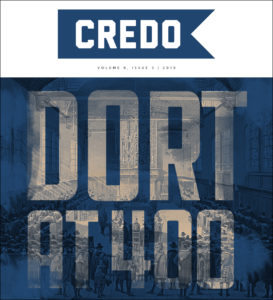Yes, I did write a fully-illustrated children’s book about the Synod of Dort, a seventeenth-century, Latin-speaking, theologically advanced deliberative assembly held in a European country smaller than most American states (The Glory of Grace: The Story of the Canons of Dort [Reformation Heritage, 2012]). Well, it’s worse than that. I wrote a three-book illustrated series on reformed confessions for young children. Should I have my head examined? Or might it actually be important for parents to teach their children about Dort and other historic summaries of the Christian faith?
Practicing Contention and Catholicity
The context of Dort, as a deliberative assembly meant to clarify biblical doctrines, teaches modern children that truth is worthy of contention (Jude 3). The world sees theological controversy as hairsplitting but God’s children must continue to distinguish truth from error; to do so is God-like. Dort, part of the great cloud of witnesses (Heb. 12:1), speaks against contemporary theological apathy. Theology matters. We must engage vital topics that can easily be misunderstood and which rouse strong opinions, such as predestination. Immature Christians are fond of lumping nearly every imaginable topic into the bin of “secondary” (read, unimportant) matters. The Canons are inherently polemical; they not only seek to defend the truth but also identify errors that should be rejected. God’s children must continue to distinguish truth from error; to do so is God-like. Click To Tweet
But Dort also teaches us and our children how to contend as members of the catholic, universal church. Healthy Christians will carefully listen to the voice of the historic and contemporary family of God; the great Synod of 1618–19 was made up of pastors, elders, professors and civic leaders from Holland, Germany, Switzerland, and England. The Dortian tradition eschews contention that promotes sectarianism. The Canons put it this way: “following the example of the apostles, we are to think and to speak in the most favorable way about those who outwardly profess their faith and better their lives, for the inner chambers of the heart are unknown to us” (3/4.15). Creedal religion, like that promoted at Dort, gives greater weight to the fundamentals of the faith than to the agendas of our micro-traditions.
Balancing Controversy and Civility
Well-meaning Christian parents might think it best to shield their children from theological controversies. But isn’t it better to provide our children with methodological tools for properly engaging in the disagreements that they cannot possibly avoid? In the closing “Rejection of False Accusations” the Dort authors suggest several rules for theological controversy.
(1) We must undertake theological controversies “in a godly and reverent manner,” remembering that our dialogue partners will be affected not only by what we say but how we say it. I wish I had learned from Dort at a younger age that it is possible to win the argument but lose the heart.
(2) We must be true to our opponent’s positions. Dort warns of “how heavy a judgment of God awaits those who give false testimony against…churches and their confessions, trouble the consciences of the weak, and seek to prejudice the minds of many against the fellowship of true believers.” Social-media-theology-hacks beware.
(3) We must submit to Scripture. We so easily argue for what makes sense to us. But Dort cautions us to “think and also speak with Scripture according to the analogy of faith; and…refrain from all those ways of speaking which go beyond the bounds set for us by the genuine sense of the Holy Scriptures.”
(4) We must engage in theological disagreement for the sake of God’s glory. Self-promoting theological dueling betrays a sectarian immaturity. The Dort theologians believed that all theology should be done “with a view to the glory of God’s name, holiness of life, and the comfort of anxious souls.”
(5) We must seek God’s help in prayer. As we engage in hard theology we must look to “God’s Son Jesus Christ, who sits at the right hand of God and gives gifts to men.” The world doesn’t need more self-confident theologians who would never think to pray for Christ to “sanctify us in the truth [and] lead to the truth those who err.” Creedal religion, like that promoted at Dort, gives greater weight to the fundamentals of the faith than to the agendas of our micro-traditions. Click To Tweet
Children who are only told not to disagree deserve better. They deserve biblical guidance on how to fight for God’s reputation according to his rules. A message of grace and truth is worthy of a method characterized by grace and truth.
Relating Sin and Grace
As J.I. Packer has argued, the so-called five points of Calvinism really teach one vital point: God saves sinners. The cultural catechisms of our day teach children just the opposite: God might not exist. If there is a god he is an idea, not a sovereign being. No matter; salvation is well within our grasp, especially if we all work together.
Despite heavy doses of believe-in-yourself pop theology children are not so easily deceived. Deep down adults and children know that our problems are more than social, they are alarmingly personal and beyond our ability to fix. Every child who has turned from a mirror disgusted by her looks, or who is frightened by his secret thoughts, knows human problems run deep. We and our children need hope that comes from outside of even concerted human effort. The good news is not that people can partner with God or each other to work out salvation, but that the triune God completely saves spiritually dead sinners. The “five points” that Dort stresses are just what our children need to hear.
Yes, sin has poisoned every part of us making us unable even to desire God apart from his renewing grace. We are totally depraved. But unconditional election assures us that no one is more qualified than another to be chosen by God. Christ died not to make salvation possible—now you do the rest—but to fully accomplish salvation for God’s eternally beloved children. Definite atonement teaches children to say with Paul, “Christ loved me and gave Himself for me” (Gal. 2:20). God’s irresistible grace alone brings us from death to life and makes God desirable to those whom the Spirit regenerates. And, despite our many fears of not finishing well, because of God’s sovereign saving grace, his children will experience glorification. Children especially—as they find themselves on the far end of a dangerous pilgrimage—need to be convinced of the perseverance of the saints.
Children know more than we give them credit for. Why do adults marvel over children’s technological acuity and cultural awareness, but remain content to offer them paltry theology that is well beneath their paygrade? I recently preached through the biblical doctrines highlighted by the Canons of Dort, article-by-article, in two dozen sermons with children in attendance. In fact, those able to read joined their voices with the rest of the congregation in vocalizing, straight from the confession, the truths we would hear expounded in the sermon. Start ‘em young is a fair paraphrase of Mark 10:14–15. Our young people read through and give assent to the Canons of Dort (as well as the Heidelberg Catechism and Belgic Confession) before publicly professing their faith. Some of what they read is well over their heads. We think that gives them noble theological goals to pursue. Isn’t that better than the alternative?


